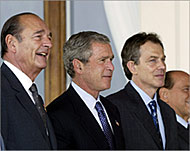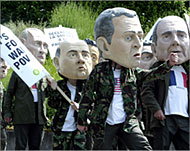G8 summit coming to a close
The summit meeting between the group of eight leading industrialised countries (G8) concludes in France today after three days of discussions between world leaders.
 |
| Show of unity after the divisions over US-led war on Iraq |
The summit was the first opportunity for many of the leaders to meet since deep divisions developed over the handling of Iraq. Discussions focused on the fight against terrorism and the spread of weapons of mass destruction.
In a statement issued on Monday, G8 leaders called global terrorism and the proliferation of weapons of mass destruction “the pre-eminent threat to international security”.
It said the world community had to use weapons inspections, export controls “and, if necessary, other measures” to tackle the threat of these weapons.
“We strongly urge North Korea to visibly, verifiably and irreversibly dismantle any nuclear weapons programmes,” said the statement.
It also added that Iran’s nuclear programme could lead to weapons production.
Russia has been helping Iran build a nuclear reactor, a contract US officials strongly oppose.
The G8 nations – Canada, France, Germany, Italy, Japan, Russia, the UK and the US – also issued an action plan designed to keep portable surface-to-air missiles out of the hands of “terrorists”.
Bush, Chirac meet
During the meetings French President Jacques Chirac met his American counterpart, George W Bush.
 |
| G8 summits attract thousands of anti-globalisation protesters |
The meetings were closely watched for signs of reconciliation. President Chirac angered the Bush administration by not supporting the US-led war on Iraq.
Afterwards, both leaders said their meeting had been held in a positive manner. Chirac intends to meet Bush in the United States later in the year, he said.
US President George Bush and UK Prime Minister Tony Blair have left the host city Evian. But other leaders are expected to continue talks and issue their final statement on Tuesday.
The G8 summit, which ususally focuses on global economies, also attracts thousands of anti-globalisation and anti-capitalism proteseters.
Peaceful demonstrations took place during the meetings, but in Geneva, thousands of protesters clashed with riot police for a third consecutive night.
Over the weekend, police used tear gas and water cannons on rioters who looted shops in Geneva.
But again on Monday night, police used tear gas, rubber pellets and water cannons to disperse demonstrators who staged a sit-in after refusing to be searched by police.